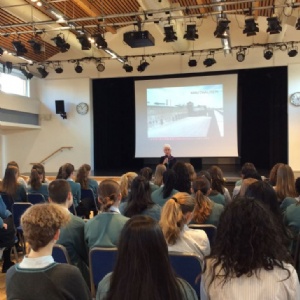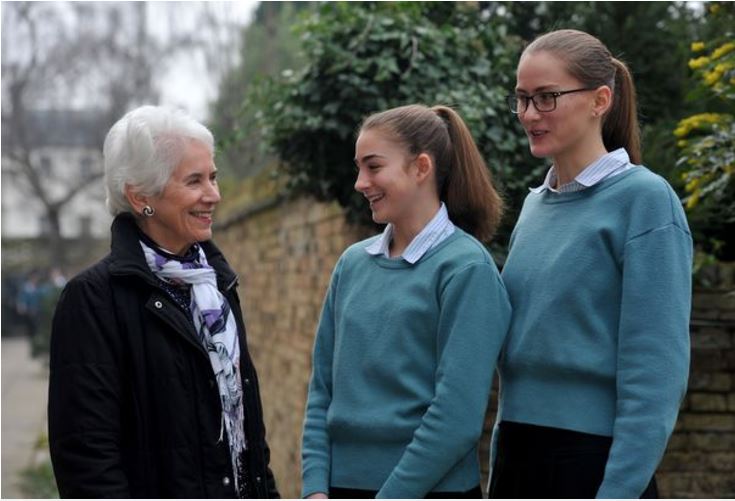
Commemorating International Holocaust Day with Eva Clarke, Holocaust survivor
Published on 29/01/18

Eva Clarke, Holocaust survivor, recounts her and her mother's story for our Year 10 students.
In recognition of Holocaust Memorial Day, one of our Year 10 students, also called Eva, has recounted the powerful talk that Eva Clarke gave on her and her mother's story as Holocaust survivors:
Saturday 27th January marks the day that the largest Nazi concentration and death camp Auschwitz-Birkenau was liberated, and is honoured all around the world as International Holocaust Memorial Day. On this day, we remember the genocide that resulted in the death of an estimated 6 million Jewish people, 200,000 Romani people, 250,000 mentally and physically disabled people, and 9,000 homosexual men - and other subsiquent genocides.
In commemoration of this day, the whole of Year 10 was taken off timetable on Monday 22nd January to learn about the Holocaust. We had the honour of listening to a talk by Eva Clarke, a Holocaust survivor who was, against all odds, born in a Nazi concetration camp, and hearing her and her mother Anka's story.
Her mother and large family, along with countless other Jewish people living in Nazi-occupied areas, were sent to concentration camps when war broke out, and she was sent to Theresienstadt. Although men and women were separated, Anka and her husband met up secretly and she became pregnant with Eva's older brother. He passed away soon after his birth, which was tragically fortunate for Anka as she was transported to Auschwitz-Birkenau where upon arrival she would have been killed immediately if seen holding an infant. However, she was pregnant for a second time and did whatever it took to hide and deny it, as she and her baby, Eva, would have been murdered. As an abled-bodied young woman, she was sent to work in an ammunitions factory in Dresden, becoming increasingly pregnant whilst continuing laborious work. Eva told us how one night her mother recalled hearing bomber planes flying over the city whilst being inside the factory. Anka and her fellow workers, although at serious risk of being killed by a bomb, were overjoyed at the sound of the Allies' planes; the prospect of being liberated seemed closer than ever. As the war drew nearer to an end, Anka was forcibly moved to another death camp. During the grueling journey, people were being transported, piled up onto coal wagons and were given no food and very little water throughout the fortnight. Many died, but Eva's mother surrounded by corpses and now heavily pregnant, was still able to hold on despite being severely malnourished. Anka claimed that she wouldn't have survived that journey if it weren't for a farmer who caught sight of her while the train was at a stop. He brought back a glass of milk for her, and although at first a Nazi officer threatened to kill Anka if she accepted, the officer miraculously backed down. Later she would describe herself as a "pregnant skeleton". She gave birth shortly after whilst on a cart being taken to the camp, Mauthausen, and was even allowed to be seen by a doctor. The sole reason for Anka and her baby's survival, Eva told us, was that the camp had run out of gas for the gas chambers the day before they arrived. If Eva's mother had reached the camp only a few days earler, both of them would have been gassed: a chilling prospect. The camp was liberated several days later, which according to Anka was just in time, as she was on the verge of death.
Anka and her baby, Eva were practically the only members of her family to survive the Holocaust. Eva's father was killed days before the liberation of Auschwitz-Birkenau in a death march. Anka never visited Auschwitz after the war, it was understandably too hard for her.
After hearing her story, we were given the chance to ask questions. Eva made one thing very clear throughout her speech and in the question and answer session: she holds no hatred towards Germans to this day. She has not forgiven the people responsible for the Holocaust and doesn not think this is necessary. Eva tells her story so that these terrible events are not forgotten, and to urge people not to believe in stereotypes, not to hold any prejudice against Germans alive today, or any group which we may label as less human and less deserving of respect than ourselves.
Our students were extremely moved by the braveness of Eva in telling her remarkable story and wished to thank her tremendously for sharing it.
